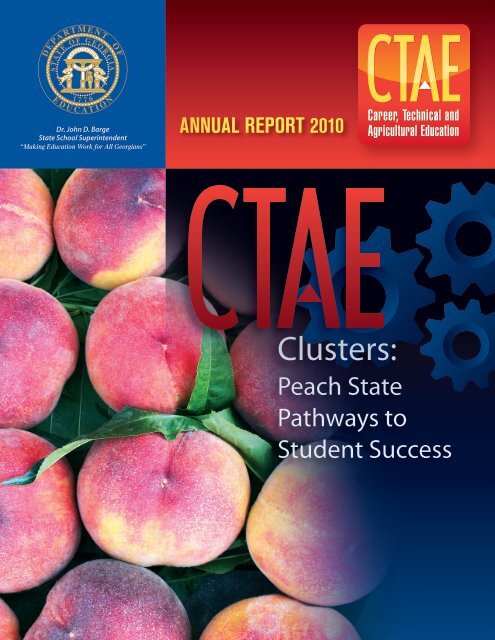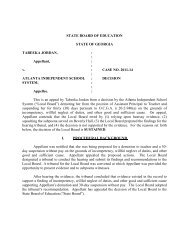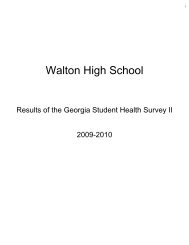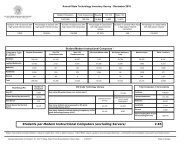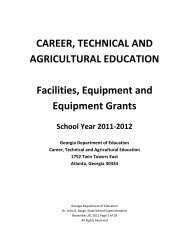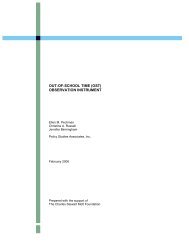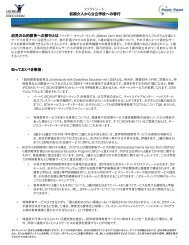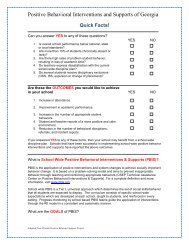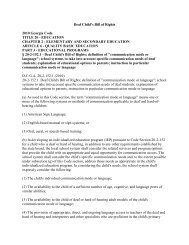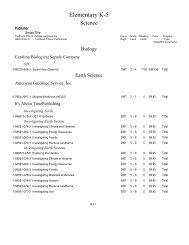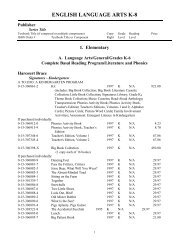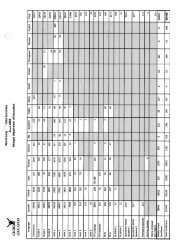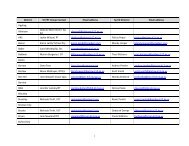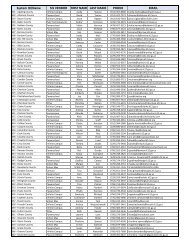CTAE Annual Report - GADOE Georgia Department of Education
CTAE Annual Report - GADOE Georgia Department of Education
CTAE Annual Report - GADOE Georgia Department of Education
You also want an ePaper? Increase the reach of your titles
YUMPU automatically turns print PDFs into web optimized ePapers that Google loves.
D E PA RT M E N T O F<br />
S TAT E O F G E O R G I A<br />
E D U C A T I O N<br />
Dr. John D. Barge<br />
State School Superintendent<br />
“Making <strong>Education</strong> Work for All <strong>Georgia</strong>ns”<br />
AnnuAl RepoRt 2010<br />
Clusters:<br />
Peach State<br />
Pathways to<br />
Student Success
D E PA RT M E N T O F<br />
S TAT E O F G E O R G I A<br />
E D U C A T I O N<br />
Dr. John D. Barge, State School Superintendent<br />
Dear Friends and Colleagues,<br />
Thank you for your interest in learning more about the <strong>Georgia</strong><br />
<strong>Department</strong> <strong>of</strong> <strong>Education</strong>’s Career, Technical, and Agricultural<br />
<strong>Education</strong> (<strong>CTAE</strong>) programs. Our ongoing work continues to be<br />
focused on developing relevant career pathways aligned to the 21st century workplace. We<br />
are guided by our vision - Making <strong>Education</strong> Work for All <strong>Georgia</strong>ns. I strongly believe that we<br />
can accomplish that vision by providing students with the vast array <strong>of</strong> opportunities <strong>of</strong>fered<br />
through our Career Cluster Pathways initiative.<br />
One <strong>of</strong> the most fundamental obligations <strong>of</strong> any society is to prepare its young people to lead<br />
productive lives as adults. To help our students be successful in today’s world <strong>of</strong> work, we must<br />
<strong>of</strong>fer them the opportunity to gain a solid foundation <strong>of</strong> knowledge and skills before they leave<br />
high school. Our goal is to provide students, beginning with the elementary grades, with the<br />
appropriate preparation, career exploration, and supports necessary for success. Unfortunately,<br />
far too many students leave high school without a diploma because they can’t see a connection<br />
between their program <strong>of</strong> study and tangible opportunities in the labor market. In <strong>Georgia</strong>, we<br />
are working diligently to address this critical issue.<br />
Our vision <strong>of</strong> Making <strong>Education</strong> Work for All <strong>Georgia</strong>ns also benefits the business and industry<br />
communities because our <strong>CTAE</strong> Career Cluster Pathways are aligned to their workforce needs.<br />
We are also transforming student work-based learning opportunities and working to increase<br />
the number <strong>of</strong> students who graduate from high school with an industry certification credential.<br />
Students who follow our Career Cluster Pathways are not only prepared for their chosen careers,<br />
but also are provided with a real-life connection to what is being taught in our core classes <strong>of</strong><br />
mathematics, social studies, science, and English. Additionally, our pathways promote critical<br />
thinking and problem solving -- important skills for our nation’s future leaders.<br />
By blending core academics with our <strong>CTAE</strong> programs, I believe we are creating a road map to<br />
success for all students. I am proud to provide more details about our initiatives through this<br />
annual report. Your continued interest in our work will be appreciated as we move forward in<br />
our vision for Making <strong>Education</strong> Work for All <strong>Georgia</strong>ns.<br />
Sincerely,<br />
John D. Barge, Ed.D<br />
Office <strong>of</strong> the State Superintendent <strong>of</strong> Schools<br />
“Making <strong>Education</strong> Work for All <strong>Georgia</strong>ns”<br />
2066 Twin Towers East • 205 Jesse Hill Jr. Drive • Atlanta, GA 30334 • www.gadoe.org<br />
An Equal Opportunity Employer
CtAe overview 2<br />
Achievements 4<br />
CtAe programs 5<br />
progam Areas 6<br />
Student organizations 15<br />
Future Directions 16<br />
<strong>Annual</strong> <strong>Report</strong> 2010<br />
FROM THE DIRECTOR OF <strong>CTAE</strong>…<br />
Parents, Students, and Stakeholders,<br />
The future economic strength <strong>of</strong> <strong>Georgia</strong><br />
and the economic strength <strong>of</strong> our great<br />
nation depend on the success <strong>of</strong> our<br />
students. The <strong>Georgia</strong> <strong>Department</strong><br />
<strong>of</strong> <strong>Education</strong> Career, Technical and<br />
Agriculture <strong>Education</strong> (<strong>CTAE</strong>) programs<br />
will continue to aim toward our goal <strong>of</strong><br />
ensuring that every student in <strong>Georgia</strong><br />
graduates college and is career ready.<br />
Thanks to the pr<strong>of</strong>essionalism and hard work <strong>of</strong> our <strong>CTAE</strong> teachers,<br />
our students have again surpassed the state’s graduation rate for<br />
all students. In FY10, our <strong>CTAE</strong> concentrators graduated at a rate <strong>of</strong><br />
91.80%. Many <strong>of</strong> our students come to school solely for the purpose<br />
<strong>of</strong> attending the <strong>CTAE</strong> classes where relevancy and the development<br />
<strong>of</strong> relationships are essential components in all daily lesson plans. Our<br />
<strong>CTAE</strong> programs and pathways are making a difference in student<br />
achievement.<br />
Our Career and Technical Student Organizations (CTSOs) continue to<br />
grow in membership. These organizations are important because they<br />
<strong>of</strong>fer opportunities for further growth in leadership and technical skills<br />
to our students outside <strong>of</strong> the classroom. The CTSOs are extensions <strong>of</strong><br />
our programs.<br />
Our Work-Based Learning programs continue to strive for excellence.<br />
Through Youth Apprenticeship, internships, and cooperative<br />
opportunities, approximately 19,000 <strong>CTAE</strong> students earned<br />
approximately $25 million in FY10. Industry leaders are beginning<br />
to see that our students are better prepared for the 21st Century<br />
workforce with good work ethics and technical skills.<br />
Industry certification <strong>of</strong> the <strong>CTAE</strong> programs continues to be very<br />
important. We appreciate industry leaders taking the time to review<br />
and recognize outstanding programs. Our <strong>CTAE</strong> programs have been<br />
blessed with the support <strong>of</strong> our <strong>Georgia</strong> Legislative members, our<br />
State School Board members, and our State School Superintendent,<br />
Dr. John Barge. They understand the significant contribution <strong>of</strong> our<br />
<strong>CTAE</strong> programs in the education <strong>of</strong> all <strong>Georgia</strong> students.<br />
In the future, <strong>CTAE</strong> will continue to be the catalyst that ensures that<br />
100% <strong>of</strong> <strong>Georgia</strong>’s students graduate from high school. We have come<br />
a long way in the re-engineering <strong>of</strong> <strong>CTAE</strong> in <strong>Georgia</strong> over the past five<br />
years. Now we need to renew our spirit and motivation in creating,<br />
revising, and enhancing program opportunities for all students.<br />
Sincerely,<br />
Audrey Bergeron, Director<br />
Career, Technical and Agricultural <strong>Education</strong><br />
1
<strong>CTAE</strong> OVERVIEW<br />
Career, Technical and Agricultural <strong>Education</strong> Clusters...<br />
Peach State Pathways to Student Success<br />
<strong>CTAE</strong> At-A-Glance<br />
<strong>Georgia</strong> <strong>Department</strong> <strong>of</strong> <strong>Education</strong><br />
2009-2010 <strong>Georgia</strong> Career, Technical and<br />
Agricultural <strong>Education</strong><br />
Secondary <strong>Education</strong>—Grades 6-12<br />
<strong>CTAE</strong> Programs<br />
180 Local School Systems<br />
Total <strong>Georgia</strong> Student Enrollment<br />
519,700 Students in Grades 9-12<br />
413,688 Students in Grades 6-8<br />
Student Enrollment in <strong>CTAE</strong> Classes<br />
(Students enrolled in one or more <strong>CTAE</strong> courses)<br />
62.23% <strong>of</strong> all Students in Grades 9-12 Statewide<br />
(323,412 students)<br />
55.95% <strong>of</strong> all Students in Grades 6-8 Statewide<br />
(231,438 students)<br />
<strong>CTAE</strong> Enrollment by Gender in Middle and High Schools<br />
Male 51%<br />
Female 49%<br />
<strong>CTAE</strong> Enrollment by Race<br />
Black 41.21%<br />
Hispanic 9.40%<br />
White 44.77%<br />
Other 5.62%<br />
<strong>CTAE</strong> High School Concentrators<br />
(3 or more classes in a Career Pathway)<br />
78,831 Students<br />
Graduation Rate for <strong>CTAE</strong> Concentrators<br />
91.81%<br />
Diploma Type Earned by <strong>CTAE</strong> High School Completers<br />
(35,620)<br />
College Prep 19.65%<br />
Technical/Career 36.75%<br />
Dual Seal 43.60%<br />
Student Enrollment is the unduplicated count: Each student is<br />
counted once, although he/she could be enrolled in more than one<br />
<strong>CTAE</strong> program area.<br />
Data Source: <strong>Georgia</strong> <strong>Department</strong> <strong>of</strong> <strong>Education</strong> Website (2009-2010<br />
<strong>CTAE</strong> Enrollment), data tables provided by the <strong>CTAE</strong> division, and<br />
Perkin’s IV Consolidated <strong>Annual</strong> <strong>Report</strong> FY 2009-2010.<br />
2<br />
<strong>Georgia</strong> Career, Technical and Agricultural <strong>Education</strong> (<strong>CTAE</strong>)<br />
career clusters are designed to ensure the success <strong>of</strong> each<br />
student. With a 91.81% graduation rate <strong>of</strong> <strong>CTAE</strong> High School<br />
Concentrators who take a sequence <strong>of</strong> three or more classes in a<br />
single Career Pathway, <strong>CTAE</strong> students graduate at a rate higher<br />
than all <strong>Georgia</strong> students (80.9%). Through <strong>CTAE</strong> classes and handson<br />
labs, Career Technical Student Organizations (CTSOs), college<br />
classes, and on-the-job experiences, students complete high school<br />
with marketable career skills and are prepared for employment,<br />
further training, and postsecondary education. <strong>CTAE</strong> students are<br />
on the pathway to successful and pr<strong>of</strong>itable careers that support the<br />
<strong>Georgia</strong> economy.<br />
The state career and technical education system consists <strong>of</strong> programs<br />
<strong>of</strong>fered at the middle and secondary school level by the Career,<br />
Technical and Agricultural <strong>Education</strong> (<strong>CTAE</strong>) Division <strong>of</strong> the <strong>Georgia</strong><br />
<strong>Department</strong> <strong>of</strong> <strong>Education</strong> (GaDOE) and at the postsecondary level<br />
by the Technical College System <strong>of</strong> <strong>Georgia</strong> (TCSG). Guidelines <strong>of</strong><br />
the Carl D. Perkins Career and Technical <strong>Education</strong> Improvement<br />
Act <strong>of</strong> 2006 (Perkins IV) align the <strong>CTAE</strong> program with the academic<br />
indicators <strong>of</strong> the No Child Left Behind Act.<br />
The <strong>CTAE</strong> programs with over 50 Career Pathways directly address<br />
the <strong>Georgia</strong> <strong>Department</strong> <strong>of</strong> <strong>Education</strong> Strategic Plan Goal 3 –<br />
Improve Workforce Readiness Skills. Each <strong>CTAE</strong> Career Pathway<br />
integrates a strong academic preparation with current and emerging<br />
career opportunities and workforce needs and skills. The <strong>CTAE</strong><br />
Career Pathways are designed and updated on an ongoing basis, in<br />
concert with the Governor’s Office <strong>of</strong> Workforce Development, State<br />
Workforce Investment Board, the state’s colleges and universities,<br />
the Governor’s Centers <strong>of</strong> Innovation, and recognized pr<strong>of</strong>essional<br />
credentialing groups . <strong>Georgia</strong> Career Pathways, widely recognized as<br />
the best in the nation, develop a well-educated, technically trained<br />
and highly competitive workforce that stimulates <strong>Georgia</strong>’s economy.<br />
Programs <strong>of</strong> study under <strong>CTAE</strong> are:<br />
Incorporating and aligning secondary and postsecondary<br />
education<br />
Including academic and <strong>CTAE</strong> content in a coordinated,<br />
non-duplicative progression <strong>of</strong> courses<br />
Including the opportunity for secondary students to acquire<br />
postsecondary credits<br />
Leading to an industry-recognized credential or certificate<br />
at the postsecondary level, or an associate or baccalaureate<br />
degree<br />
Identifying and addressing current or emerging<br />
occupational opportunities<br />
<strong>CTAE</strong> Mission: To prepare students to be successful<br />
as they transition to college and the workforce.
7.2%<br />
6.6%<br />
7.4%<br />
5.7%<br />
15.1%<br />
2%<br />
2.3%<br />
4.3%<br />
Note: Student enrollment in each <strong>CTAE</strong> program area is an<br />
unduplicated count. A student could be counted more than once<br />
if enrolled in multiple programs.<br />
Engineering & Technology <strong>Education</strong> 124,186<br />
Business & Computer Science 113,182<br />
Family & Consumer Sciences 79,714<br />
Agricultural <strong>Education</strong> 21,126<br />
Healthcare Science <strong>Education</strong> 1,682<br />
Middle School Students (Grades 6-8) Enrolled<br />
in each Program Area in 2009-2010<br />
15.8%<br />
33.6%<br />
23.5%<br />
High School Students (Grades 9-12) Enrolled in<br />
each Program Area in 2009-2010<br />
Business and Computer Science 141,040<br />
Family and Consumer Science 66,409<br />
Architecture, Construction,<br />
Communications & Transportation 63,535<br />
Engineering and Technology <strong>Education</strong> 31,153<br />
Agricultural <strong>Education</strong> 30,422<br />
Healthcare Science <strong>Education</strong> 27,537<br />
<strong>Education</strong> 23,906<br />
Marketing, Sales and Services <strong>Education</strong> 17,960<br />
Culinary Arts 9,827<br />
Government and Public Safety 8,148<br />
6.2% .5%<br />
33.3%<br />
36.5%<br />
<strong>Georgia</strong>’s bold vision is to equip all <strong>Georgia</strong> students, through effective teachers and leaders and through<br />
creating the right conditions in <strong>Georgia</strong>’s schools and classrooms, with the knowledge and skills to empower<br />
them to 1) Graduate from high school, 2) Be successful in college and/or pr<strong>of</strong>essional careers, and 3) Be<br />
competitive with their peers throughout the United States and the world.<br />
— Governor Nathan Deal, State <strong>of</strong> <strong>Georgia</strong><br />
3
ACHIEVEMENTS<br />
<strong>CTAE</strong> Achievements in 2009-10<br />
Academic Achievements <strong>of</strong> <strong>CTAE</strong> Students<br />
 89.12% <strong>of</strong> <strong>CTAE</strong> Concentrators who took the <strong>Georgia</strong> High<br />
School Graduation Test (GHSGT) met or exceeded state<br />
standards in English/Language Arts<br />
 72.46% <strong>of</strong> <strong>CTAE</strong> Concentrators who took the <strong>Georgia</strong> High<br />
School Graduation Test met or exceeded state standards in<br />
Mathematics<br />
Graduation Rate for <strong>CTAE</strong> Concentrators<br />
ÂÂ91.81% graduated with regular diplomas in FY 2010<br />
ÂÂ<strong>CTAE</strong> graduation rate <strong>of</strong> 91.81% compares favorably with<br />
<strong>Georgia</strong>’s overall graduation rate <strong>of</strong> 80.9% in 2010<br />
<strong>Georgia</strong> <strong>CTAE</strong> exceeded the federal performance level targets in<br />
2 categories <strong>of</strong> Academic Attainment in FY 2010<br />
English/Language Arts<br />
(% passing GHSGT)<br />
Mathematics<br />
(% passing GHSGT)<br />
State FY 10<br />
Target<br />
Actual<br />
Performance<br />
88% 89.12%<br />
73% 72.46%<br />
Graduation rate 78% 91.81%<br />
<strong>CTAE</strong> Postsecondary Transitions<br />
 A total <strong>of</strong> 5,110 high school students dual enrolled in collegelevel<br />
<strong>CTAE</strong> courses at <strong>Georgia</strong>’s technical colleges or other<br />
colleges with technical divisions<br />
 A total <strong>of</strong> 959 high school students joint enrolled in collegelevel<br />
<strong>CTAE</strong> courses at <strong>Georgia</strong>’s technical colleges or other<br />
colleges with technical divisions<br />
<strong>CTAE</strong> Teacher Achievements<br />
 620 pr<strong>of</strong>essional development workshops, including onsite,<br />
distant learning, and Webinar sessions, were held with a total<br />
attendance <strong>of</strong> 7,978 <strong>CTAE</strong> educators throughout the state in<br />
FY 2010<br />
<strong>CTAE</strong> High School Program Enrollment: Three Year Trends<br />
160,000<br />
140,000<br />
120,000<br />
100,000<br />
80,000<br />
60,000<br />
40,000<br />
20,000<br />
0<br />
4<br />
AGED ACCT BCS CUL EDU ENGR FACS PSAFETY HCSTE MKT<br />
<strong>CTAE</strong> Program Achievements<br />
 441 <strong>CTAE</strong> programs were industry certified in FY 2010<br />
 56% <strong>of</strong> all middle school and 62% <strong>of</strong> all high school<br />
students were enrolled in <strong>CTAE</strong> courses in FY 2010<br />
 Student enrollment increased in the following high school<br />
<strong>CTAE</strong> programs compared to FY 2009<br />
Culinary Arts (48%)<br />
Agricultural <strong>Education</strong> (5.9%)<br />
Engineering and Technology (5.8%)<br />
Healthcare Science <strong>Education</strong> (5.4%)<br />
Marketing, Sales & Services <strong>Education</strong> (4.9%)<br />
<strong>Education</strong> (0.7%)<br />
 Student enrollment increased in the following middle<br />
school <strong>CTAE</strong> programs compared to FY 2009<br />
Engineering and Technology <strong>Education</strong> (6.6%)<br />
Agriculture <strong>Education</strong> (6%)<br />
Business and Computer Science (0.1%)<br />
ÂÂHealthcare Science <strong>Education</strong> program was established<br />
at the middle school level in FY 2010 with 1,682 students<br />
participating<br />
ÂÂStudent membership in Career Technical Student<br />
Organizations numbered 147,214 in FY 2010 (a 6 %<br />
membership increase compared to FY 2009)<br />
ÂÂStudent membership increased during 2010 in all the<br />
<strong>Georgia</strong> Career Technical Student Organizations<br />
ÂÂ98% <strong>of</strong> employers participating in the <strong>Georgia</strong> Youth<br />
Apprenticeship Program agreed that students performed<br />
at the level expected<br />
ÂÂ97% <strong>of</strong> employers participating in the <strong>Georgia</strong> Youth<br />
Apprenticeship Program found the program beneficial to<br />
their company, and 99.8% <strong>of</strong> employers would recommend<br />
the program to other companies<br />
<strong>CTAE</strong> Middle School Program Enrollment: Three Year Trends<br />
160,000<br />
140,000<br />
120,000<br />
100,000<br />
80,000<br />
60,000<br />
40,000<br />
20,000<br />
0<br />
AGED BCS ENGR FACS HCSTE<br />
2007–08<br />
2008–09<br />
2009–10
<strong>CTAE</strong> PROGRAMS<br />
<strong>CTAE</strong> CArEEr PAThwAys –<br />
All the Right Programs…High School and Middle School Curriculum, Assessment,<br />
and Work-Based Learning… Working Together for <strong>Georgia</strong>’s Student Success<br />
During the FY 2010 school year, the <strong>CTAE</strong> Division <strong>of</strong> the <strong>Georgia</strong><br />
<strong>Department</strong> <strong>of</strong> <strong>Education</strong> conducted statewide field testing activities<br />
as a part <strong>of</strong> its End-<strong>of</strong>-Pathway Assessment (EOPA) implementation<br />
activities. School systems were asked to participate in field testing<br />
activities on a voluntary basis in the following five career pathway areas:<br />
Accounting<br />
Architectural Drawing & Design<br />
Small Business Development<br />
Therapeutic Services: Medical Services<br />
Therapeutic Services: Nursing<br />
The following credentialing exams were <strong>of</strong>fered to pathway completers:<br />
Business Financial Management Assessment: National<br />
Occupational Competency Testing Institute (NOCTI)<br />
Architectural Drafting Assessment: SkillsUSA<br />
Fundamental Business Concepts Exam: Assessment <strong>of</strong> Skills<br />
and Knowledge (A*S*K Institute)<br />
Certified Nurse Aide (Assistant) Exam: <strong>Georgia</strong> Medical Care<br />
Foundation/Nurse Aide Competency Evaluation Service<br />
(NACES)<br />
National Healthcare Foundation Skills Assessment: National<br />
Consortium for Health Science <strong>Education</strong> (NCHSE)<br />
Only those students who had successfully completed the three<br />
designated courses in the above referenced career pathways<br />
participated in the field testing activities. The <strong>CTAE</strong> Division was pleased<br />
with the number <strong>of</strong> systems that volunteered to take part in this most<br />
worthwhile initiative. The participants included:<br />
29 school systems with 40 high schools<br />
337 high school students who earned industry certified<br />
credentials<br />
<strong>CTAE</strong> Career Pathways<br />
High School Foundation Skills<br />
Technical Skills<br />
Academic Foundations<br />
Communications<br />
Problem Solving and Critical Thinking<br />
Information Technology Applications<br />
Organizational Systems<br />
Safety, Health and Environment<br />
Leadership and Teamwork<br />
Ethics and Legal Responsibilities<br />
Career Development<br />
Entrepreneurship<br />
Selecting career pathway courses in middle and<br />
high school enables students to have a head<br />
start toward a successful future in their careers.<br />
CTSO Core Values For Career Success<br />
Commitment – To create among members, educators and<br />
business and industry an adherence and appreciation for all<br />
Career, Technical and Agricultural <strong>Education</strong> Programs<br />
Conviction – To develop patriotism through knowledge <strong>of</strong> our<br />
nation’s heritage and practice <strong>of</strong> democracy<br />
<strong>Education</strong> – To create enthusiasm and empower students to<br />
become lifelong learners<br />
Integrity – To deal honestly and fairly with one another<br />
Leadership – To develop leadership abilities through<br />
participation in educational, pr<strong>of</strong>essional, community and<br />
social activities<br />
Pr<strong>of</strong>essionalism – To promote high standards in career ethics,<br />
workmanship, scholarship and safety<br />
Recognition – Appreciation <strong>of</strong> the value <strong>of</strong> achievement<br />
Service – To cultivate a desire to contribute to the benefit and<br />
welfare <strong>of</strong> others<br />
Teamwork – To enhance the ability <strong>of</strong> students to plan<br />
together, organize and carry out worthy activities and projects<br />
through the use <strong>of</strong> the democratic process<br />
<strong>Education</strong>-Career Partnership Initiative<br />
Through the <strong>Education</strong>-Career Partnership the <strong>Georgia</strong><br />
<strong>Department</strong> <strong>of</strong> <strong>Education</strong>, the Technical College System <strong>of</strong><br />
<strong>Georgia</strong>, and the <strong>Georgia</strong> Board <strong>of</strong> Regents strengthen and<br />
expand seamless education opportunities to benefit <strong>Georgia</strong><br />
high school students as they pursue their chosen careers.<br />
<strong>Georgia</strong>’s technical colleges and other colleges and universities<br />
with technical divisions provide postsecondary education<br />
options for high school students that enhance their education in<br />
their identified Career Pathway. The <strong>Education</strong>-Career Partnership<br />
Initiative, an integral part <strong>of</strong> <strong>CTAE</strong> Program Career Pathways,<br />
makes it possible for high school students to participate in<br />
college classes through dual enrollment, joint enrollment, and<br />
articulated classes. Students may graduate high school with<br />
college credits and in some cases Certificates, Diplomas, or<br />
Associate Degrees in a career area.<br />
<strong>Georgia</strong> Technical<br />
Colleges<br />
<strong>Georgia</strong> Colleges<br />
with Technical<br />
Divisions<br />
Total student<br />
enrollment<br />
Number <strong>of</strong> High School Students<br />
Enrolled in College Level Courses FY 2010<br />
Dual<br />
enrollment<br />
courses<br />
Joint<br />
enrollment<br />
courses<br />
Total<br />
student<br />
enrollment<br />
4,940 959 5,899<br />
170 N/A 170<br />
5,110 959 6,069<br />
5
PROGRAM AREAS<br />
AGRICULTURE EDUCATION (AGED) 2009-2010<br />
6<br />
Enrollment by Gender in Grades 9-12<br />
(Unduplicated Count)<br />
High School Student Enrollment in Agriculture <strong>Education</strong><br />
in FY 2010<br />
(Duplicated Count)<br />
Grade 6-8 Student Enrollment in Agriculture <strong>Education</strong> Courses<br />
in FY 2010<br />
Total 30,422<br />
Male 19,604 (64%)<br />
Female 10,818 (36%)<br />
Pathway-Related Course Enrollment – 104,530<br />
• Plant Science/Horticulture 17,303 (17%)<br />
• Agriculture Mechanics 16,495 (16%)<br />
• Agriscience 15,157 (15%)<br />
• Forestry & Natural Resources 15,045 (14%)<br />
• Animal Science 14,968 (14%)<br />
• Veterinary Science 12,859 (12%)<br />
• Agribusiness Management 12,703 (12%)<br />
Other AGED Courses<br />
• 2,985<br />
21,126<br />
Number <strong>of</strong> Industry-Certified Programs Note: AGED programs adopted new industry certification<br />
standards and is in the process <strong>of</strong> programs becoming industry<br />
certified.<br />
Number <strong>of</strong> <strong>CTAE</strong> Teachers FY 2010 391 High School Teachers<br />
82 Middle School Teachers<br />
AGRICULTURE EDUCATION (AgEd) consists <strong>of</strong> three distinct<br />
but interrelated components. A basic component is classroom<br />
and laboratory experiences. In the classroom, students learn<br />
concepts and theories dealing with a broad spectrum <strong>of</strong><br />
agricultural and agribusiness topics. The classroom is followed<br />
by the laboratory mode <strong>of</strong> instruction where concepts and<br />
theories are carried through to their application. Here, the<br />
students are taught “hands-on” skills to ensure that the skills<br />
learned are practical and usable. The third component, the<br />
FFA student organization, provides students an avenue for<br />
developing leadership skills. Both classroom and laboratory<br />
instruction are put to use in the Supervised Agricultural<br />
Experience Program (SAEP) component <strong>of</strong> the program. In this<br />
approach, students work and learn in a real-life situation where<br />
they obtain on-the-job skills.<br />
Mission: To be a premier learning system that delivers agricultural,<br />
environmental, and leadership education programs and services.
ARCHITECTURE, CONSTRUCTION, COMMUNICATIONS<br />
& TRANSPORTATION (ACCT) 2009-2010<br />
ARCHITECTURE, CONSTRUCTION, COMMUNICATIONS &<br />
TRANSPORTATION (ACCT) program activities include classroom<br />
and laboratory experiences that enable students to gain technical<br />
and academic skills in laboratories that simulate “real-world”<br />
work environments in their specific areas <strong>of</strong> interest. Students<br />
have opportunities with hands-on projects, on-the-job training,<br />
and challenging classroom curriculum that include relevant<br />
math, communications and computers. To gain real-world skill<br />
development in the work place, students may incorporate workbased<br />
learning experiences into their schedule. SkillsUSA, the<br />
ACCT student organization, provides co-curricular activities and<br />
opportunities that help students develop academic and technical<br />
skills and encourage them to become better citizens.<br />
Enrollment by Gender in Grades 9-12<br />
(Unduplicated Count)<br />
High School Student Enrollment in Architecture,<br />
Construction & Transportation <strong>Education</strong> in<br />
FY 2010<br />
(Duplicated Count)<br />
Number <strong>of</strong> Industry-Certified Programs: 126<br />
Total 63,535<br />
Male 43,574 (69%)<br />
Female 19,961 (31%)<br />
Pathway-Related Course Enrollment -- 84,057<br />
• Construction 12,835 (15%)<br />
• Broadcast/Video Production 12,077 (14%)<br />
• Transportation/Logistical Support – Ground Marine 10,909 (13%)<br />
• Transportation/Logistical Operations – Ground Marine 9,755 (12%)<br />
• Architectural Drawing & Design 8,948 (11%)<br />
• Heating, Ventilation, Air Conditioning, and Refrigeration (HVACR) 8,270<br />
(10%)<br />
• Graphic Design 7,765 (9%)<br />
• Graphic Communications 7,529 (9%)<br />
• Metals 4,597 (5%)<br />
• Flight Operations 596 (1%)<br />
• Collision Repair 529 (1%)<br />
• Aircraft Support 247 (less than 1%)<br />
Other ACCT Courses<br />
• 2,743<br />
Number <strong>of</strong> <strong>CTAE</strong> Teachers FY 2010 736 High School Teachers<br />
The automotive industry demands a rigid adherence to quality, and our product and manufacturing is<br />
considered highly technical. Combine this with a tight labor market, and it is critical that we have a welleducated<br />
workforce. The secondary technical education students have helped us considerably--they are<br />
motivated, well prepared, and appreciate being able to learn valuable job skills while they further their<br />
education. To date, we have had 19 students complete the program and become full-time employees.<br />
—Elizabeth Umberson, Plant Manager<br />
ZF Industries<br />
Gainesville, <strong>Georgia</strong><br />
7
PROGRAM AREAS<br />
BUSINESS & COMPUTER SCIENCE (BCS) 2009-2010<br />
8<br />
Enrollment by Gender in Grades 9-12<br />
(Unduplicated Count)<br />
High School Student Enrollment in Business and Computer<br />
Science in FY 2010<br />
(Duplicated Count)<br />
Grade 6-8 Student Enrollment in Business and Computer<br />
Science Courses in FY 2010<br />
Number <strong>of</strong> Industry-Certified Programs: 133<br />
Total 141,040<br />
Male 73,964 (52%)<br />
Female 67,076 (48%)<br />
Pathway-Related Course Enrollment – 242,401<br />
• Administration/Information Support 63,403 (26%)<br />
• Small Business Development 42,737 (18%)<br />
• Financial Mgmt. – Accounting 39,097 (16%)<br />
• Financial Mgmt. – Services 34,927 (14%)<br />
• Interactive Media 27,086 (11%)<br />
• Computing 17,469 (7%)<br />
• Computer Systems & Support 16,649 (7%)<br />
• Computer Networking 1,033 (less than 1%)<br />
Other BCS Courses<br />
• 7,574<br />
113,182<br />
Number <strong>of</strong> <strong>CTAE</strong> Teachers FY 2010 1,806 High School Teachers<br />
368 Middle School Teachers<br />
BUSINESS and COMPUTER SCIENCE (BCS) programs consist<br />
<strong>of</strong> three components: classroom/ laboratory experiences,<br />
which provide instruction that meets industry-validated<br />
standards; work-based learning directly related to classroom<br />
instruction in the form <strong>of</strong> internships, cooperative education,<br />
school-based enterprises, and youth apprenticeship; and the<br />
career and technical student organization <strong>of</strong> FBLA, which<br />
provides co-curricular activities within the program area<br />
to develop teamwork and leadership skills. BCS programs<br />
prepare students to become productive members <strong>of</strong><br />
the business community and to enter a postsecondary<br />
institution after graduation. Students develop competencies<br />
in such areas <strong>of</strong> instruction as finance, legal operations <strong>of</strong><br />
business, administrative support, information management,<br />
international business, entrepreneurship, and management.<br />
As an employer in a small, rural community, for more than 25 years we have experienced the<br />
results and realize the value <strong>of</strong> secondary technical education programs <strong>of</strong>fered students<br />
in our schools. Students are given a chance to acquire skills needed in the workforce, giving<br />
them a way to be productive, self-supporting citizens. These students learn work ethics and<br />
build self-confidence in seeing the fruits <strong>of</strong> their efforts. Six <strong>of</strong> the students whom we hired<br />
from these programs have remained with us from high school through their adult careers as a<br />
viable, contributing part <strong>of</strong> our workforce.”<br />
—Jimmy Benefield, President<br />
Farmers and Merchants Bank, Lakeland, <strong>Georgia</strong>
CULINARY ARTS (CUL) 2009-2010<br />
CULINARY ARTS is a growing program based on the American Culinary<br />
Federation Standards and has articulations with postsecondary institutions.<br />
Students in this field gain knowledge in diet, nutrition, food preparation, cost<br />
and budgets, and the science <strong>of</strong> food. Culinary Arts is designed for students<br />
to learn the “art” <strong>of</strong> cooking in many diverse roles, such as Sous Chef, Pastry<br />
Chef, Kitchen Manager, Garde Manager, Banquet Chef, and Restaurant<br />
Entrepreneur. Students participate in hands-on activities through the FCCLA<br />
student organization.<br />
Enrollment by Gender in Grades 9-12<br />
(Unduplicated Count)<br />
High School Student Enrollment in Culinary Arts in FY 2010<br />
(Duplicated Count)<br />
Number <strong>of</strong> Industry-Certified Programs 5<br />
Total 9,827<br />
Male 3,483 (35%)<br />
Female 6,344 (65%)<br />
Pathway-Related Courses Enrollment – 9,153<br />
Number <strong>of</strong> <strong>CTAE</strong> Teachers FY 2010 119 High School Teachers<br />
The Culinary Arts curriculum is based on American Culinary Federation<br />
Standards, and has articulations with Technical Colleges in <strong>Georgia</strong>, as<br />
well as many <strong>of</strong> the finest Culinary Arts schools in the nation.<br />
EDUCATION (EDU ) 2009-2010<br />
EDUCATION is designed for students who are interested in pursuing a career in the education field. There are many diverse career<br />
opportunities, including school administrator, school counselor, elementary school teacher, special needs teacher, secondary teacher,<br />
post secondary teacher, career and technical teacher, preschool teacher, and parapr<strong>of</strong>essional. Students have two career pathways to<br />
choose from: Early Childhood <strong>Education</strong> & Teaching as a Pr<strong>of</strong>ession. These pathways introduce the foundations <strong>of</strong> education combined<br />
with the knowledge and skills gained in both the classroom and in the workplace, and prepare students for a career in education.<br />
Enrollment by Gender in Grades 9-12<br />
(Unduplicated Count)<br />
High School Student Enrollment in <strong>Education</strong> in FY 2010<br />
(Duplicated Count)<br />
Number <strong>of</strong> Industry-Certified Programs 5<br />
Total 23,906<br />
Male 2,908 (12%)<br />
Female 20,998 (88%)<br />
Pathway-Related Courses Enrollment – 24,068<br />
• Early Childhood <strong>Education</strong> 20,744 (81%)<br />
• Teaching as a Pr<strong>of</strong>ession 4,874 (19%)<br />
Number <strong>of</strong> <strong>CTAE</strong> Teachers FY 2010 158 High School Teachers<br />
<strong>Education</strong> and how we can improve the education <strong>of</strong> our students is a major focus in<br />
<strong>Georgia</strong>, as well as many other states in the nation. The large number <strong>of</strong> educators that are<br />
at, or nearing, the age <strong>of</strong> retirement, combined with the small number <strong>of</strong> teacher educators<br />
graduating from college, is a concern. These are reasons this <strong>Education</strong> Program Area is<br />
important –we need to start growing our own teachers in communities across <strong>Georgia</strong>.<br />
9
PROGRAM AREAS<br />
ENGINEERING AND TECHNOLOGY EDUCATION (ENGR) 2009-2010<br />
10<br />
Enrollment by Gender in Grades 9-12<br />
(Unduplicated Count)<br />
High School Student Enrollment in Engineering and<br />
Technology <strong>Education</strong> in FY 2010<br />
(Duplicated Count)<br />
Grade 6-8 Student Enrollment in Engineering and<br />
Technology <strong>Education</strong> Courses in FY 2010<br />
Number <strong>of</strong> Industry-Certified Programs: 51<br />
ENGINEERING AND TECHNOLOGY EDUCATION (ENGR)<br />
concentration combines hands-on projects with a<br />
rigorous curriculum to prepare students for challenging<br />
careers. ENGR programs utilize computer and educational<br />
technology in the delivery <strong>of</strong> content related to systems <strong>of</strong><br />
communication, energy/power, transportation, production,<br />
and bio-related technologies. Technology education<br />
develops technological literacy as a part <strong>of</strong> the students’<br />
fundamental education through an activity-based study <strong>of</strong><br />
past, present, and future technological systems and their<br />
resources, processes, and impact on society. In addition to<br />
classroom and laboratory experiences, students participate<br />
in TSA student organization activities.<br />
Total 31,153<br />
Male 24,609 (79%)<br />
Female 6,544 (21%)<br />
Pathway-Related Courses Enrollment -- 42,771<br />
• Engineering 19,051 (45%)<br />
• Energy Systems 13,205 (31%)<br />
• Engineering Graphics & Design 8,214 (19%)<br />
• Electronics 1,356 (3%)<br />
• Manufacturing 945 (2%)<br />
Other ENGR Courses<br />
• 574<br />
124,186<br />
Number <strong>of</strong> <strong>CTAE</strong> Teachers FY 2010 482 High School Teachers<br />
290 Middle School Teachers<br />
I get so much more than just a paycheck. They make me feel like I am an important<br />
part <strong>of</strong> this Siemens plant and that the work I do is <strong>of</strong> high quality and needed by<br />
Siemens.<br />
—Sean Carty, Apprenticeship Student<br />
Siemens Energy and Automation, Forsyth, <strong>Georgia</strong>
FAMILY AND CONSUMER SCIENCES (FACS) 2009-2010<br />
Enrollment by Gender in Grades 9-12<br />
(Unduplicated Count)<br />
High School Student Enrollment in Family and Consumer<br />
Sciences <strong>Education</strong> in FY 2010<br />
(Duplicated Count)<br />
Grade 6-8 Student Enrollment in Family and Consumer<br />
Science Courses in FY 2010<br />
Total 66,409<br />
Male 16,879 (25%)<br />
Female 49,530 (75%)<br />
Pathway-Related Courses Enrollment – 32,356<br />
• Nutrition & Food Science 25,353 (78%)<br />
• Interior & Fashion Design 5,676 (18%)<br />
• Consumer Services 1,327 (4%)<br />
Other FACS Courses<br />
• 8,328<br />
79,714<br />
Number <strong>of</strong> <strong>CTAE</strong> Teachers FY 2010 501 High School Teachers<br />
203 Middle School Teachers<br />
FAMILY AND CONSUMER SCIENCES (FACS)<br />
education combines relevant coursework,<br />
classroom projects, internships, and student<br />
organization activities to <strong>of</strong>fer a unique focus<br />
on families, work, and their interrelationships.<br />
FACS and the student organization FCCLA<br />
provide a solid foundation for success in a<br />
broad range <strong>of</strong> careers that require strong<br />
leadership, pr<strong>of</strong>essional, and interpersonal<br />
skills. Students learn to manage resources to<br />
meet the essential needs <strong>of</strong> individuals and<br />
families, to promote optimal nutrition and<br />
wellness across the life span, and to accept<br />
responsibility for actions and success in family,<br />
work, and the diverse global society.<br />
The Family and Consumer Science program prepares students for postsecondary education<br />
and careers in the business related aspects <strong>of</strong> family and consumer sciences. It provides<br />
opportunities to develop the knowledge, skills, attitudes, and behaviors that students need to<br />
become responsible citizens and leaders; and to manage the challenges <strong>of</strong> living and working<br />
in a diverse global society.<br />
11
PROGRAM AREAS<br />
GOVERNMENT & PUBLIC SAFETY (PSAFETY) 2009-2010<br />
Enrollment by Gender in Grades 9-12<br />
(Unduplicated Count)<br />
High School Student Enrollment in Government and Public<br />
Safety in FY 2010<br />
(Duplicated Count)<br />
Number <strong>of</strong> Industry-Certified Programs 0<br />
COORDINATED CAREER ACADEMIC EDUCATION/PROJECT SUCCESS (CCAE/PS) 2009-2010<br />
Enrollment by Gender in Grades 9-12<br />
(Unduplicated Count)<br />
Total 8,148<br />
Male 4,538 (56%)<br />
Female 3,610 (44%)<br />
Number <strong>of</strong> <strong>CTAE</strong> Teachers FY 2010 83 High School Teachers<br />
Total 6,936<br />
Male 3,620 (52%)<br />
Female 3,316 (48%)<br />
Number <strong>of</strong> <strong>CTAE</strong> Teachers FY 2010 83 High School Teachers<br />
Pathway-Related Courses Enrollment – 8,194<br />
• Law and Justice 7,984 (98%)<br />
• Homeland Security & Emergency Services 105 (1%)<br />
• Firefighting 105 (1%)<br />
The GOVERNMENT & PUBLIC SAFETY program<br />
concentration provides students with the basic<br />
technical skills and solid academic foundation<br />
required to pursue a career in a wide range <strong>of</strong> fastgrowing<br />
career fields. Through classroom, laboratory,<br />
and on-the-job training, students learn about a variety<br />
<strong>of</strong> agencies and pr<strong>of</strong>essions in law enforcement,<br />
private security, corrections, fire, and emergency<br />
management services. Choosing a career in the<br />
service industry provides students with a challenging<br />
pathway to their future. Students participate in related<br />
activities through SkillsUSA.<br />
If you visit a public safety program in <strong>Georgia</strong>, you may see a mock trial in progress, a<br />
simulated crime scene, CPR training, the fingerprinting process, a table top emergency plan, or<br />
a demonstration <strong>of</strong> fire rescue techniques, but you definitely will see students who are excited<br />
about learning.<br />
COORDINATED CAREER ACADEMIC EDUCATION/PROJECT SUCCESS provides educational and occupational services<br />
to assist students in becoming responsible, productive citizens. Through participation in the CCAE/PS support services,<br />
students in grades 9-12 learn about the world <strong>of</strong> work and employment skills they need to be successful. Throughout their<br />
school years, students have the opportunity to develop knowledge, attitudes and experiences that will serve as a substantial<br />
base for decision making when they reach points in their lives when they must make education or career decisions.<br />
12
HEALTHCARE SCIENCE EDUCATION (HCSTE) 2009-2010<br />
HEALTHCARE SCIENCE EDUCATION programs prepare<br />
students to enter and succeed in a wide variety <strong>of</strong><br />
expanding healthcare careers. Students learn basic<br />
concepts <strong>of</strong> health, wellness, and preventive care, medical<br />
terminology, microbiology, life-support skills, and the ethical<br />
and legal responsibilities <strong>of</strong> healthcare providers, as well as<br />
problem solving and decision making skills. Students may<br />
participate in HOSA or SkillsUSA student organizations.<br />
According to the <strong>Georgia</strong> <strong>Department</strong> <strong>of</strong> Labor, by the year<br />
2014, health services will account for one in every 12 jobs<br />
in <strong>Georgia</strong>. The healthcare field is projected to increase by<br />
almost 100,000 jobs. Based on this projection, there will be<br />
more than 420,000 jobs in healthcare by 2014.<br />
Enrollment by Gender in Grades 9-12<br />
(Unduplicated Count)<br />
High School Student Enrollment in Healthcare Science<br />
<strong>Education</strong> (HCSTE) <strong>Education</strong> in FY 2010<br />
(Duplicated Count)<br />
Grade 6-8 Student Enrollment in Healthcare Science<br />
<strong>Education</strong> Courses in FY 2010<br />
Number <strong>of</strong> Industry-Certified Programs: 56<br />
CAREER AND TECHNICAL INSTRUCTION (CTI) 2009-2010<br />
CAREER AND TECHNICAL INSTRUCTION is designed<br />
to support students with disabilities enrolled in <strong>CTAE</strong><br />
classes and in participation in Career Technical Student<br />
Organizations. The goal <strong>of</strong> the secondary level support<br />
services is to provide students with employment<br />
opportunities at the completion <strong>of</strong> their <strong>CTAE</strong> experience.<br />
Total 27,537<br />
Male 4,967 (18%)<br />
Female 22,570 (82%)<br />
Pathway-Related Course Enrollment – 134,547<br />
• Therapeutic Services- Nursing 24,407 (18%)<br />
• Therapeutic Services- Medical 22,799 (17%)<br />
• Therapeutic Services- Emergency 17,075 (13%)<br />
• Health Informatics 16,654 (12%)<br />
• Diagnostic Services 16,114 (12%)<br />
• Physical Medicine 16,070 (12%)<br />
• Biotechnology Research & Development 16,101 (12%)<br />
• Personal Care Services -- Cosmetology 5,327 (4%)<br />
1,682<br />
Number <strong>of</strong> <strong>CTAE</strong> Teachers FY 2010 275 High School Teachers (Healthcare)<br />
84 High School Teachers (Cosmetology)<br />
9 Middle School Teachers<br />
A new middle school curriculum is now being <strong>of</strong>fered in some schools to start students thinking<br />
about Healthcare at an even earlier age. Employment in the healthcare industry will provide<br />
students with a financially stable and rewarding career <strong>of</strong> service to others. Having a chance to<br />
begin this quest while still in middle or high school is a wonderful way for students to prepare<br />
for their future.<br />
Enrollment by Gender in Grades 9-12<br />
(Unduplicated Count)<br />
Total 5,920<br />
Male 3,770 (64%)<br />
Female 2,150 (36%)<br />
Number <strong>of</strong> <strong>CTAE</strong> Teachers FY 2010 278 High School Teachers<br />
13
PROGRAM AREAS<br />
MARKETING, SALES AND SERVICES EDUCATION (MKT) 2009-2010<br />
Enrollment by Gender in Grades 9-12<br />
(Unduplicated Count)<br />
High School Student Enrollment in Marketing, Sales and<br />
Services <strong>Education</strong> (MKT) in FY 2010<br />
(Duplicated Count)<br />
Number <strong>of</strong> Industry-Certified Programs: 65<br />
JUNIOR RESERVE OFFICERS TRAINING CORPS (JROTC) 2009-2010<br />
High School Student Enrollment in<br />
JROTC-Related Courses in FY 2010<br />
by Type <strong>of</strong> Service<br />
MARKETING, SALES AND SERVICES EDUCATION programs develop student<br />
knowledge and skills in the foundation areas <strong>of</strong> marketing (economics, human<br />
relations and business basics) and the functional areas <strong>of</strong> marketing (product<br />
and service planning, marketing information management, purchasing and<br />
pricing, selling and promotion, risk management, financing and distribution/<br />
logistics). In addition, students study international marketing, management,<br />
and entrepreneurship. DECA provides students with a variety <strong>of</strong> real-world<br />
experiences. Students are prepared to enter careers in marketing, management,<br />
and entrepreneurship, as well as to pursue postsecondary education.<br />
• U.S. Army 16,565<br />
• U. S. Air Force 7,736<br />
• U.S. Navy 6,976<br />
• U.S. Marines 2,244<br />
Total 17,960<br />
Male 7,915 (44%)<br />
Female 10,045 (56%)<br />
Number <strong>of</strong> <strong>CTAE</strong> Teachers FY 2010 150 High School Teachers<br />
Pathway-Related Course Enrollment – 51,120<br />
• Marketing & Management 12,533 (22%)<br />
• Fashion Marketing 12,147 (21%)<br />
• Sports & Entertainment Marketing 11,784 (21%)<br />
• Travel Marketing & Lodging Management 10,433 (18%)<br />
• Marketing Communication & Promotion 10,223 (18%)<br />
Other MKT Courses<br />
• 546<br />
The American Marketing Association and the <strong>Georgia</strong> <strong>Department</strong> <strong>of</strong> <strong>Education</strong> continue to refine<br />
the standards by which exemplary Marketing <strong>Education</strong> Programs are evaluated and certified. The<br />
strength <strong>of</strong> these business partnerships ensures that curriculum meets industry specifications.<br />
JUNIOR RESERVE OFFICERS TRAINING CORPS <strong>of</strong>fers the opportunity<br />
for high school students to be enrolled in a citizenship program<br />
that combines classroom instruction and practical application with<br />
extracurricular activities. The curriculum teaches leadership, time<br />
management, and organizational procedures, the rights, responsibilities,<br />
and privileges <strong>of</strong> citizenship, and how our military serves our government. It provides leadership opportunities and helps<br />
the student cadet develop a sense <strong>of</strong> personal responsibility and build life skills. JROTC, under the umbrella <strong>of</strong> the Career,<br />
Technical and Agricultural <strong>Education</strong> Division <strong>of</strong> the <strong>Georgia</strong> <strong>Department</strong> <strong>of</strong> <strong>Education</strong>, <strong>of</strong>fers courses that satisfy pathway<br />
concentration provisions as students earn credit toward graduation. ROTC students earn scholarship rewards and contribute<br />
hours <strong>of</strong> community service locally.<br />
14
STUDENT ORGANIZATIONS<br />
Career Technical Student Organizations (CTSO) <strong>CTAE</strong> Program FY 2010<br />
Membership<br />
Membership in the <strong>Georgia</strong> Future Farmers <strong>of</strong> America (FFA) was at an alltime<br />
high in FY 2010 and <strong>Georgia</strong> ranked 3rd in the nation. The FFA makes<br />
a positive difference in the lives <strong>of</strong> students by developing their potential for<br />
premier leadership, personal growth, and career success through agricultural<br />
education.<br />
SkillsUSA <strong>of</strong> <strong>Georgia</strong> is a partnership <strong>of</strong> students, teachers, and industry<br />
representatives working together to ensure America has a skilled work force.<br />
The organization helps each student excel. SkillsUSA is a national nonpr<strong>of</strong>it<br />
organization serving teachers and high school students who are preparing for<br />
careers in trade, technical and skilled service occupations. <strong>Georgia</strong> membership<br />
is the 13th largest in the nation.<br />
Future Business Leaders <strong>of</strong> America (FBLA) is the largest and oldest business<br />
student organization in the world, preparing students for careers in business<br />
and business-related fields. The mission is to bring business and educators<br />
together in a positive working relationship through innovative leadership and<br />
career development programs. Both middle and high school students may<br />
participate.<br />
The Technology Student Association (TSA) is the oldest student organization<br />
dedicated exclusively to students enrolled in engineering and technology<br />
education classes in grades K-12. TSA promotes engineering and technology<br />
education as a means <strong>of</strong> preparing students for the dynamic world, and invites<br />
them to become critical thinkers, problem solvers, and technologically literate<br />
leaders. Members <strong>of</strong> TSA are given the opportunity to demonstrate their abilities<br />
and learn new skills.<br />
Family, Career and Community Leaders <strong>of</strong> America (FCCLA) is a dynamic<br />
and effective national student organization that helps young men and women<br />
become leaders and address important personal, family, work, and societal<br />
issues through Family and Consumer Services <strong>Education</strong>. It is the only career and<br />
technical student organization with the family as its central focus. Participation in<br />
national programs and chapter activities helps members become strong leaders<br />
in their families, careers, and communities. The <strong>Georgia</strong> FCCLA has the largest<br />
membership <strong>of</strong> all CTSO organization in the state and placed 3rd overall for<br />
the State Achievement Award.<br />
The mission <strong>of</strong> Health Occupations Students <strong>of</strong> America (HOSA) is to enhance<br />
the delivery <strong>of</strong> compassionate, quality health care by providing opportunities for<br />
knowledge, skill and leadership development for all health science technology<br />
education students. HOSA students will help meet the growing needs <strong>of</strong> the<br />
health care community.<br />
The mission <strong>of</strong> Distributive <strong>Education</strong> Club <strong>of</strong> America (DECA) is to enhance<br />
the co-curricular education <strong>of</strong> students with interests in Marketing, Management<br />
and Entrepreneurship. DECA helps students develop skills and competence<br />
for Marketing careers, build self esteem, experience leadership and practice<br />
community experience. DECA membership in <strong>Georgia</strong> ranks 3rd in the nation.<br />
<strong>Georgia</strong> Career Student Association (GCSA) helps students learn about the<br />
world <strong>of</strong> work and the employment skills they need to be successful. GCSA assists<br />
students in reaching their potential and becoming well-rounded individuals.<br />
Members develop confidence and maturity through meeting challenges and<br />
completing projects.<br />
Agriculture 30,269<br />
Architecture,<br />
Construction,<br />
Communication &<br />
Transportation,<br />
Cosmetology,<br />
Government &<br />
Public Safety<br />
Business and<br />
Computer Science<br />
Engineering &<br />
Technology<br />
Family &<br />
Consumer<br />
Sciences<br />
Healthcare<br />
Science<br />
Technology<br />
Marketing, Sales &<br />
Service<br />
Coordinated<br />
Career Academic<br />
<strong>Education</strong><br />
6,966<br />
25,466<br />
28,107<br />
32,730<br />
8,476<br />
11,688<br />
3,512<br />
15
FUTURE DIRECTIONS<br />
As the <strong>Georgia</strong> economy changes and expands, the <strong>Georgia</strong> <strong>Department</strong><br />
<strong>of</strong> <strong>Education</strong> <strong>CTAE</strong> programs will continue to evolve to ensure<br />
that every student in <strong>Georgia</strong> graduates from high school with the<br />
academic skills, hands-on experience in real work environments, and<br />
intensive career guidance required to succeed in college, employment, and<br />
life-long learning. During FY 2011 and beyond <strong>CTAE</strong> has identified several<br />
areas for special ongoing focus:<br />
16<br />
<strong>CTAE</strong> programs will be integrated with STEM <strong>Georgia</strong> (Science,<br />
Technology, Engineering, and Math). STEM education encourages a<br />
curriculum driven by problem solving, discovery, exploratory learning,<br />
and student-centered development <strong>of</strong> ideas and solutions. The<br />
ultimate goal <strong>of</strong> the competencies (21st Century Skills) is to prepare<br />
students for the careers essential for the 21st Century workplace.<br />
<strong>CTAE</strong> End-<strong>of</strong>-Pathway Assessments will continue to be identified<br />
and implemented for all career pathways.<br />
Non-Traditional Career Pathways will be promoted based on<br />
enrollment data, including attracting female students to enroll in<br />
the career areas <strong>of</strong> Architecture, Construction, Communication<br />
and Transportation; Agriculture; and Engineering and Technology<br />
<strong>Georgia</strong> Shared Ownership<br />
GA <strong>Department</strong> <strong>of</strong> <strong>Education</strong><br />
Technical College System <strong>of</strong> GA<br />
GA <strong>Department</strong> <strong>of</strong> Labor<br />
GA Board <strong>of</strong> Regents<br />
Governor’s Office <strong>of</strong> Workforce<br />
Development<br />
Governor’s Strategic Industries<br />
GA Work-Ready Initiative<br />
<strong>Georgia</strong> Chamber <strong>of</strong> Commerce<br />
Governor’s Centers <strong>of</strong> Innovation<br />
GA Dept. <strong>of</strong> Economic Development<br />
GA Finance Commission<br />
<strong>Georgia</strong> Student Finance Commission <strong>CTAE</strong> Success:<br />
Postsecondary <strong>Education</strong> Options<br />
<strong>Education</strong>al Career Partnerships<br />
(Articulated Courses)<br />
Dual Enrollment<br />
Joint Enrollment<br />
Advanced Placement<br />
Career Development<br />
Career Awareness K-5<br />
Career Exploration 6-8<br />
Career Training 9-16<br />
Transitional Activities<br />
Special Populations<br />
Occupations that lead to economic<br />
self-sufficiency<br />
Self-advocacy<br />
Equal access to programs<br />
Non-discrimination<br />
Nontraditional programs<br />
Support to graduate<br />
Assist to meet program standards<br />
Prepare for additional training<br />
Instruction<br />
Teachers Pr<strong>of</strong>essional Learning<br />
State-<strong>of</strong>-the-Art Technology<br />
Real Work Experience/Mentoring<br />
Coordinated Career Academic<br />
<strong>Education</strong><br />
Youth Apprenticeship Program<br />
Internships<br />
Junior Reserve Officers<br />
Training Corps<br />
Skilled High School<br />
Graduate with Career<br />
Pathway Certificate and<br />
Career Plan<br />
<strong>Education</strong>; and attracting male students to enroll in Family and<br />
Consumer Sciences, <strong>Education</strong>, and Healthcare Science.<br />
Industry Certification will be expanded to include additional Career<br />
Pathways.<br />
Curriculum Guides will be developed to support all Career Pathways.<br />
In-Service <strong>Education</strong> Opportunities will continue to provide highlevel<br />
pr<strong>of</strong>essional development for <strong>CTAE</strong> educators and counselors.<br />
Opportunities for postsecondary education during high school<br />
will continue and expand as an integrated part <strong>of</strong> <strong>CTAE</strong> Career<br />
Pathways.<br />
<strong>Georgia</strong> <strong>CTAE</strong> will reorganize the Peach State Career Pathways to align<br />
with the 16 Career Clusters and Pathways recognized nationally:<br />
Agricultural & Natural Resources; Architecture & Construction; Arts,<br />
A/V Technology & Communications; Business & Administration;<br />
<strong>Education</strong> & Training; Finance; Government & Public Administration;<br />
Health Science; Hospitality & Tourism; Human Services; Information<br />
Technology; Law & Public Safety; Manufacturing; Marketing, Sales<br />
& Service; Scientific Research/Engineering; and Transportation,<br />
Distribution & Logistics.<br />
Skills-Based Curriculum<br />
GA Performance Standards<br />
Integrated Academic & Technology<br />
Workplace Readiness<br />
Foundation Skills<br />
Career and Technical Student<br />
Organizations<br />
Postsecondary Alignment<br />
Statewide Articulation<br />
Business & Industry Standards<br />
National Curriculum<br />
Assessment<br />
End <strong>of</strong> Career Pathway Skills<br />
Academic Performance Standards<br />
State Tests—No Child Left Behind<br />
<strong>CTAE</strong> Completion<br />
Graduation Rate<br />
Business and Industry Certification<br />
Peach State Pathways<br />
Postsecondary Credentials<br />
Student<br />
Parents<br />
Counselors<br />
Teachers<br />
Business Industry<br />
Continuous Program Improvement<br />
Mentors<br />
<strong>CTAE</strong> Program Compliance Review/<br />
Technical Assistance<br />
Office <strong>of</strong> Civil Rights (OCR) Compliance<br />
Review<br />
Adding/Revising Career Pathways
E D U C A T I O N<br />
S TAT E O F G E O R G I A<br />
D E PA RT M E N T O F<br />
Dr. John D. Barge, State School Superintendent<br />
“Making <strong>Education</strong> Work for All <strong>Georgia</strong>ns”<br />
Government &<br />
Public Safety<br />
Business & Computer Science Marketing Sales & Services<br />
Government & Public Safety Pathways<br />
Firefighting<br />
Homeland Security & Emergency Services<br />
Law & Justice<br />
JROTC – Air Force, Army,<br />
Marine Corps, Navy<br />
<strong>Education</strong><br />
Business & Computer Science Pathways<br />
Administrative/ Information Support<br />
Computer Networking<br />
Computer Systems and Support Computing<br />
Financial Management–Accounting<br />
Financial Management–Services<br />
Interactive Media<br />
Small Business Development<br />
Marketing Sales & Services Pathways<br />
Fashion Marketing<br />
Marketing Communications & Promotion<br />
Marketing & Management<br />
Sports & Entertainment Marketing<br />
Travel Marketing & Lodging Management<br />
<strong>Education</strong> Pathways<br />
Early Childhood <strong>Education</strong><br />
Teaching As A Pr<strong>of</strong>ession<br />
Culinary Arts<br />
Culinary Arts Pathways<br />
Culinary Arts<br />
Family &<br />
Consumer<br />
Sciences<br />
Engineering & Technology Pathways<br />
Electronics<br />
Energy Systems<br />
Engineering<br />
Engineering Graphics & Design<br />
Manufacturing<br />
Family & Consumer Science Pathways<br />
Consumer Services<br />
Family, Community & Global Leadership<br />
Interior Design<br />
Nutrition & Food Science<br />
Arts & Humanities Pathways<br />
Journalism<br />
Foreign Language<br />
Performing Arts<br />
Visual Arts<br />
Physical Medicine<br />
Healthcare<br />
Science<br />
Healthcare Science Pathways<br />
Biotechnology Research & Development<br />
Diagnostic Services<br />
Health Informatics<br />
Therapeutic Services–Emergency Services<br />
Therapeutic Services–Medical Services<br />
Therapeutic Services–Nursing<br />
Personal Care Services-Cosmetology<br />
Agriculture Pathways<br />
Agribusiness Management<br />
Agriscience<br />
Agricultural Mechanics<br />
Animal Science<br />
Forestry/Natural Resources<br />
Plant Science/Horticulture<br />
Veterinary Science<br />
Architecture, Construction,<br />
Communication, Transportation Pathways<br />
Aircraft Support<br />
Architectural Drawing & Design<br />
Broadcast/Video Production<br />
Climate Control Systems Technology (HVACR)<br />
Collision Repair<br />
Construction<br />
Flight Operations<br />
Graphic Communications<br />
Graphic Design<br />
Marine Engine Technology<br />
Maritime Studies<br />
Metals Technology<br />
Transportation Logistical Operations (Ground/Marine)<br />
Transportation Logistical Operations (Ground/Marine)<br />
Engineering &<br />
Technology<br />
Arts &<br />
Humanities<br />
Architecture,<br />
Construction,<br />
Communications<br />
& Transportation<br />
Agriculture<br />
<strong>Georgia</strong> Program<br />
Concentrations
<strong>Georgia</strong> Career, Technical and Agricultural <strong>Education</strong><br />
<strong>Georgia</strong> <strong>Department</strong> <strong>of</strong> <strong>Education</strong><br />
1752 Twin Tower East<br />
Atlanta, GA 30334<br />
(404) 657-8304 Phone<br />
(404) 651-8984 Fax<br />
www.doe.k12.ga.us/curriculum/edtech<br />
The <strong>Georgia</strong> <strong>Department</strong> <strong>of</strong> <strong>Education</strong><br />
(GaDOE) does not discriminate on the basis<br />
<strong>of</strong> race, color, religion, sex, national origin,<br />
age, or disability in its programs, activities, or<br />
employment practices.<br />
Inquiries related to GaDOE programs may<br />
be directed to the Director <strong>of</strong> Legal Services,<br />
2052 Twin Towers East, 205 Jesse Hill Jr. Drive,<br />
Atlanta, <strong>Georgia</strong>, 30334. Inquiries related to<br />
GaDOE employment practices may be directed<br />
to the Associate Superintendent for Human<br />
Resources, 2052 Twin Towers East, 205 Jesse<br />
Hill Jr. Drive, Atlanta, <strong>Georgia</strong>, 30334.<br />
Inquiries or concerns regarding civil rights<br />
requirements and compliance by local<br />
education agencies (LEAs) should be directed<br />
to the LEA. Inquiries regarding federal civil<br />
rights requirements and compliance by LEAs<br />
may also be directed to the Office for Civil<br />
Rights, Atlanta Office, U.S. <strong>Department</strong> <strong>of</strong><br />
<strong>Education</strong>, 61 Forsyth St. S.W., Suite 19T70,<br />
Atlanta, <strong>Georgia</strong>, 30303.


